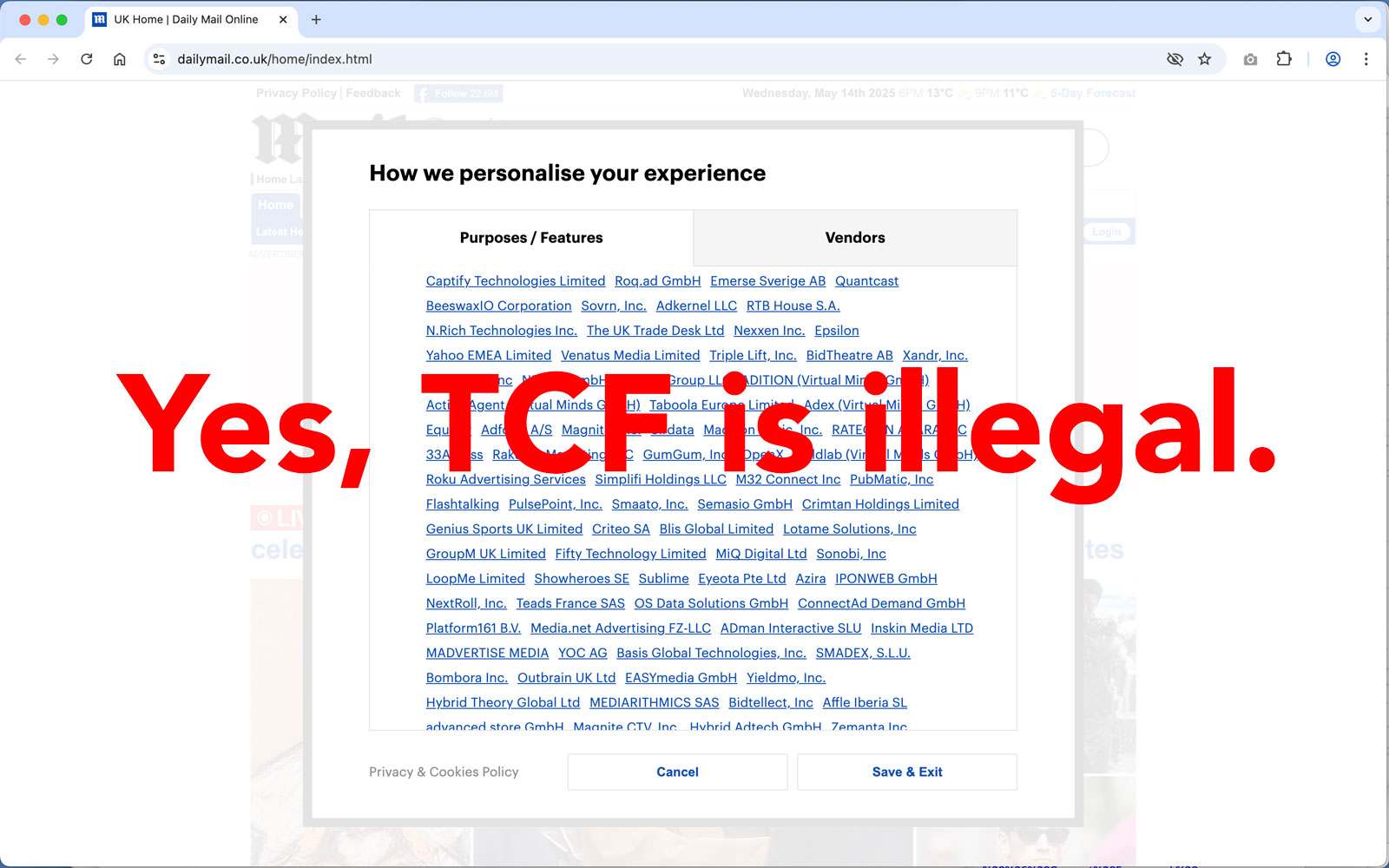- cross-posted to:
- technology@lemmy.world
- cross-posted to:
- technology@lemmy.world
Great news for online privacy!
I thought all the cookie popups that don’t have Allow all, Deny all and Customize options were all illegal by default. So many of them have huge ALLOW ALL and denying is hidden in submenu where you need to uncheck 50 entires one by ond. Why it took them so damn long?
Also for 700+ companies to fester on anyone’s browsing data is just vomit inducing and should be illegal.
You can recognize TCF is used when cookie banners have near-nonsense options for thousands of “partners”.
Totally. And that “legitimate interest” nonsense takes ages to click through 🤦
I’m using this extension on FF, it seems to be doing a decent job at unchecking all the boxes for me: https://addons.mozilla.org/de/firefox/addon/consent-o-matic/
if you’re trying to circumvent them the best method is to just disable javascript. the next best method is ublock filterlists. but i do use consentomatic as well because i’m lazy.
deleted by creator
You can disable JavaScript with uBlock Origin
Ime with ublock it’s not nearly as easy to manage allowing only specific scripts to run on each website to make it work but with less garbage added on compared to noscript
That is a great find. Thank you!
This is illegal, they are required to be opt-in, default toggled off.
“legitimate interest” is kind of a loophole, because there is some legal basis for it. This is why they think it is OK to leave it on by default.
It’s obviously not OK and those data pigs should burn in hell.
Which is also pointless - “legitimate interest” is basically them saying “i have a very good reason to access your data, as per GDPR, so I don’t need explicit consent”. Deselecting it has no effect, I think they only do that to make you lose time. The only way to avoid those companies using your data is to challenge them in court and show that they do not, in fact, have a legitimate interest. That’s their whole game
ctrl+fguillotinectrl+fprisonctrl+fjailctrl+fsentencectrl+ffinenot illegal enough
This ruling does nearly nothing for privacy. All it does is confirm that the data captured by the framework (TCF) behind cookie banners (still legal) is personal data and thus subject to GDPR.
For seven years, the tracking industry has used the TCF as a legal cover for Real-Time Bidding (RTB), the vast advertising auction system that operates behind the scenes on websites and apps. RTB tracks what Internet users look at and where they go in the real world. It then continuously broadcasts this data to a host of companies, enabling them to keep dossiers on every Internet user.[2] Because there is no security in the RTB system it is impossible to know what then happens to the data. As a result, it is also impossible to provide the necessary information that must accompany a consent request.[3]
In short, RTB makes it impossible for the user to know where his data goes, which is a requirement for consent.
Oh… I thought it meant that those cookie banners were ‘false consent’ and therefore render the data collected to be illegal?
Please provide more info - I would like to learn more about this subject!
It’s in Belgium. How does it apply in Europe globally?
Today’s judgement confirms the Belgian Data Protection Authority’s 2022 decision. It applies immediately across Europe.
Dr Ryan of Enforce said “This decision is momentous. It creates a clear need for industry to innovate and move away from the dangerous, ineffective, and fraud-riddled racking-based advertising. RTB can operate without personal data. This decision shows that it must. This good news for every person online, and for publishers, too.”
That’s what I read, but again, that’s just the interpretation of an european law by Belgium and Belgium only. Other european countries could rule otherwise, thus not creating any case law.
So all is not set, but yea it might be very possible that to avoid any risks, websites go with Belgium’s rulings of what’s illegal to avoid troubles in other countries.
_
deleted by creator
FUCK YEAH!! 🎉🎊🎉




